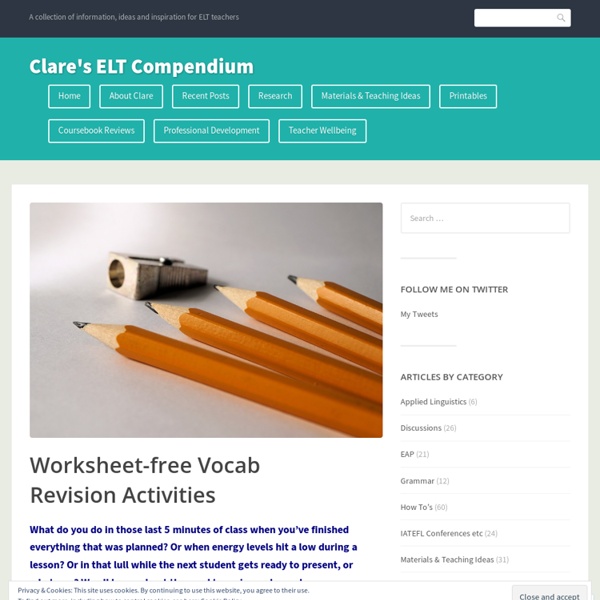The Giant Storymaker – Ideas for a Hundred Million Stories
Storytelling is one of the most important acts of communication. Every day, in our contacts with friends, relatives, colleagues and acquaintances we share stories, anecdotes – things that happened to use, stories we read about in the news, on social media, stories we heard through others. _______________________________ In class, story building and storytelling can get somewhat neglected.
What is a malaphor? It's not rocket surgery!
Have you ever mixed up your idioms and come out with something slightly… odd? Maybe you meant to comment on the relative trustworthiness of an acquaintance, but instead of saying ‘I wouldn’t trust him as far as I could throw him’ – i.e. not even a little – you crossed this with ‘I wouldn’t touch him with a bargepole’, and ended up telling the world at large that you ‘wouldn’t trust him with a bargepole’. An altogether different kettle of worms. But while your newly coined expression may technically be incorrect, it still manages to get your point across; if you don’t trust him even a little, why would you trust him with bargepole? This phenomenon of mixing idioms has a name and it’s called a malaphor.
181 Prompts to Inspire Writing and Discussion
Every day of the school year, we publish a fresh Student Opinion question. Below are all the 181 questions we asked during the 2018-19 school year (available here as a PDF), divided into two categories — those that easily lend themselves to classroom debate and persuasive writing, and those that are more suitable for creative, personal or reflective writing. Each question is based on content from The New York Times, and all are still open to comment by students 13 and older.
Listening for detail: “Kilkelly, Ireland”
American songwriter Peter Jones discovered a collection of letters in his parents’ attic written by his great-great-great grandfather, Byran Hunt, to his son, John Hunt, who had emigrated from Kilkelly in Ireland to the United States in 1855. The Great Famine in Ireland had forced large numbers of people to emigrate in search of a better life. The five-stanza ballad he wrote based on these letters cover the time period from 1860 to 1892. “Kilkelly, Ireland” is a breathtaking, thought-provoking song in which family news, including births and deaths, are shared for a period of thirty-two years. In the activity, the students listen for specific information by writing an explanation for each of the words, names or pictures in the timeline. Pat McNamara, for instance, is the teacher who writes the letters for John’s father.
Four games for vocabulary development
In this post, we’ll share four classroom games that we also find effective in teaching vocabulary to English Language Learners. Nine Box Grid We use this simple game, which we learned and modified from English teacher Katie Toppel, a lot. As you can see from the image, it’s just a matter of putting nine words (or, when we teach phonics, letters) on a numbered three-by-three grid (for a total of nine boxes/spaces) on the class whiteboard. Then, we give students mini-whiteboards (sometimes they play with a partner and sometimes individually), markers, and erasers/cloths (if you haven’t invested in a class set of mini-whiteboards, we’d strongly advise you do so - either buying them from a store or making your own – search “make mini-whiteboards” online for instructions). Next, we take out two huge foam dice we bought online for a few dollars.
Low-prep icebreaker: time travel
This icebreaker requires virtually no preparation from the teacher but is guaranteed to involve all the students and help them discover the things they have in common. A great option for groups at all levels, especially B1 and higher. The Task Here is how this ice-breaker works. Prepare three strips of paper: THE PRESENT, THE FUTURE, THE PAST.
Poetry Games for the Classroom - 22 Creative Ideas
Some kids love poetry. Their eyes light up when they get the chance to compose their own verses. But for others, poems are met with groans and grumbles. That’s where these fun poetry games and activities come in. Kids will be surprised at how accessible and meaningful poetry can be, no matter their age or interests.
One way to introduce a new vocab set
This is a different way to introduce a new vocab set to introduce to your students. I learnt it from my tutor on my CELTA course. I used it recently with my 11-year-olds and it worked really well. I think it would work with older students and higher levels too. They get a chance to strengthen their own knowledge with a bit of peer teaching and they can physically chart their learning.
35 ways to introduce your lesson topic – ELT Planning
Are you fed up with using the same old methods to introduce your lesson topic? Look no further! Here are 35 ways to kick off your lesson. How many have you tried?
The Fish Bowl: A Cooperative Learning Strategy {Post 5 of 5}
Share on Facebook0 shares on Facebook Well this wraps up my 5-part series on some of my favorite cooperative learning activities I have used over the years. If you missed the first 4, you can find them here: “Expert Groups,” “Q and A Match-Up,” “Four Corners,”and “Circle Chats.” How It Works:
7 Swedish words that English speakers shouldn’t be confused about – Student blogs from Karolinska Institutet
As an expat in Sweden (although I do speak Swedish), I sometimes find it difficult not to laugh at some of the Swedish words that have the exact same spelling of English words, but mean something extremely different. Amazingly enough, some of these words are so commonly used that you can almost hear or read them many times a day. Here’s a list of 7 words that I think English speaking people shouldn’t be confused about when they come to Sweden



